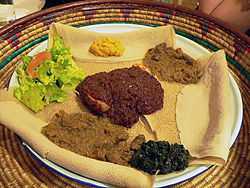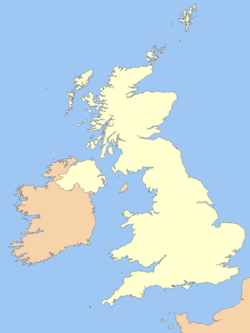Ethiopians in the United Kingdom
| Total population | |
|---|---|
|
20,000 (2005 Estimate)[1] 0.03% of the UK's population | |
| Regions with significant populations | |
|
Primarily London (North, West and South)[1] Also Sheffield, Liverpool, Leeds, Manchester[2] | |
| Languages | |
| English, Amharic, Oromo, Tigrinya, Gurage, Sidamo, others | |
| Religion | |
|
Predominantly Christianity And Islam (including Ethiopian Orthodox and Protestant),Judaism Others Traditional beliefs |
Ethiopians in the United Kingdom are an ethnic group that consist of Ethiopian immigrants to the United Kingdom as well as their descendants. Overall, it is one of the smaller subgroups of immigrants to the UK from Africa.[3]
History

The first wave of Ethiopian immigrants to the UK occurred in 1974, when many were forced from their homes when Haile Selassie's government was overthrown by the military junta, Derg. Many of these were political refugees who left behind high paid and respectable jobs. The second, larger wave of Ethiopians to the UK was in 1991, when Ethiopians of all walks of life claimed asylum in the UK. Another civil war in the country, and continuous political unrest even today means that more and more Ethiopians are leaving their homeland to seek better lives abroad.[1]
Many Ethiopians found cultural adjustment, particularly in the capital, very difficult. It is even claimed that many new immigrants believed that seeing a British policeman was something to be frightened of. It was certainly a hard time for them, especially considering that their claim for asylum may not be accepted and they had no other family or links in the UK. Over time, many Ethiopian Community Centres were formed which helped the population to develop and rebuild their lives. Prior to the civil wars, Ethiopians were free to come to the UK to study, many of whom stayed and are undoubtedly amongst the thousands who now form an ageing population. The Ethiopian community in the UK is now an extremely well integrated group that consists of many generations.[1]
Contemporary Issues
Many Ethiopians who have immigrated to the UK and their descendants express concern about the existing troubles in Ethiopia, including the political and civil unrest as well as the country's famine problem. A significant number of Ethiopians in the UK contribute and donate a lot of time and money to helping troubled people in their homeland.[4] Two Ethiopian born immigrants to the UK were convicted in connection with the alleged attempted London bombings on 21st July 2005.[5]
Community and Culture
There are now many Ethiopian churches set up across London, including St Mary's Ethiopian Orthodox Church in Battersea Park. However, most of the vibrant Ethiopian churches in London and across many cities in the UK are pentecostal or of other charismatic Christian denominations. There is also an increasing number of Ethiopian restaurants in the UK, where such Ethiopian cuisine as injera is served.[1]
Demographics
The 2001 UK Census recorded 7,775 Ethiopian born people as living in the UK which made it the country's 17th largest African immigrant group, and the 84th most common birthplace for British people.[3] In mid-2005 the number of Ethiopians in the UK was estimated at around 20,000, those of partial descent are unknown. The only countries with more Ethiopians are Ethiopia, the United States and Canada. The overwhelming majority of Ethiopians live in London (approximately 16,800 or 84% of the total Ethiopian population in the country) with the North, West and South areas being the most common places to find them. Sheffield is home to around 1,000 Ethiopians, and there are significant numbers in Liverpool, Leeds and Manchester[1][6]
32.28% of new Ethiopian immigrants to the UK are employed (the second highest unemployment rate of any immigrant group to the UK, only behind Angolans), whilst 64.44% of settled Ethiopian immigrants are employed, this is one off the largest differences between any British ethnic group. For comparison, British born people of any background have an employment rate of 73.49%.[7]
Notable Individuals
There are several British people of Ethiopian origin that have seen notable success in all field of life. Actor Peter Ustinov who is of mixed Russian, German and Ethiopian ancestry has won two Academy Awards, two Emmy Awards and one Golden Globe Award.[8] Victor Duleep Singh, Frederick Duleep Singh and Sophia Duleep Singh are all members of the Indian royal family who are of Ethiopian descent and lived in the UK. Prince Alemayehu was the son of Emperor Tewodros II of Ethiopia who lived in the UK for the majority of his life for safekeeping.
See also
Individuals
- Notable British people of Ethiopian descent
- Notable Ethiopian immigrants to the United Kingdom
Related groups in the UK
- Somali Britons
Related ethnicity articles
Other notable overseas Ethiopian communities
Other
- African migration to the United Kingdom
Notes
- ↑ 1.0 1.1 1.2 1.3 1.4 1.5 "Ethiopian London". BBC. Retrieved 2008-12-06.
- ↑ Some Ethiopian communities in the UK
- ↑ 3.0 3.1 "Country-of-birth database". Organisation for Economic Co-operation and Development. Retrieved 2008-12-06.
- ↑ Concern from Ethiopian Britons about their native Ethiopia
- ↑ 21 July 2005 convicted bombers
- ↑ Ethiopians across the UK
- ↑ BBC Born Abroad, Economics
- ↑ Peter Ustinov ethnic origins
External links
| ||||||
| ||||||||||||||||||||||||||
